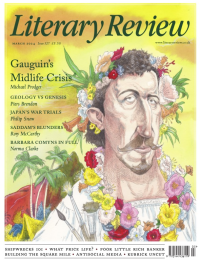Sara Wheeler
Only Connect
The Rising Down: Lives in a Sussex Landscape
By Alexandra Harris
Icon Books 368pp £20
Alexandra Harris, in this thoughtful new book, reaches back in time for human stories in the Arun Valley and the contiguous South Downs, the patch of West Sussex where she grew up. ‘I wanted’, she writes, ‘to watch what happened when people I associated with other landscapes set foot on earth I knew.’ Figures who emerge from the chalky soil range from a water bailiff recording import fees on the Arun in the 1630s to Jomo Kenyatta, the former president of Kenya, who pops up tending Sussex tomatoes in the Second World War.
Harris arranges the material in four parts, each covering a century, from the 17th to the 20th, and each made up of loosely linked vignettes and short essays that grew ‘from a moment of startled noticing or finding: a document or a painting, a date stone or a lump of concrete, a voice overheard’. Where published sources are few (notably, for the period covered in the first half of the book), she works in discoveries from regional archives, where ‘stories of human imagination are double-stacked and neatly folded’.
In the 17th century, the Sussex Quarter Sessions in the western half of the county (sitting four times a year, usually in Arundel or Petworth) licensed travelling salesmen called ‘badgers’, set the wages for servants and arbitrated quarrels about hedges, among many other issues. Harris has an eye for a glint of gold as she mines the records of these court proceedings. (‘A version of local life could be sketched’, she says, from the account of a prosecution for the theft of wheels.) Throughout, as always, working-class voices are harder to hear. Harris cleverly harnesses the letters written home by those who joined the tide of 19th-century emigration, sailing full of hope to Australia or Canada.
We learn about 17th-century cider-making, how a copperplate rolling press works, the second Duke of Richmond’s menagerie at Goodwood (a ‘haphazard imperial experiment’), and the craftsmanship of Andy Goldsworthy, who placed fourteen large chalk balls between Cocking Down and West Dean in 2002 in an installation he called Chalk Stones.

Sign Up to our newsletter
Receive free articles, highlights from the archive, news, details of prizes, and much more.@Lit_Review
Follow Literary Review on Twitter
Twitter Feed
The son of a notorious con man, John le Carré turned deception into an art form. Does his archive unmask the author or merely prove how well he learned to disappear?
John Phipps explores.
John Phipps - Approach & Seduction
John Phipps: Approach & Seduction - John le Carré: Tradecraft; Tradecraft: Writers on John le Carré by Federico Varese (ed)
literaryreview.co.uk
Few writers have been so eagerly mythologised as Katherine Mansfield. The short, brilliant life, the doomed love affairs, the sickly genius have together blurred the woman behind the work.
Sophie Oliver looks to Mansfield's stories for answers.
Sophie Oliver - Restless Soul
Sophie Oliver: Restless Soul - Katherine Mansfield: A Hidden Life by Gerri Kimber
literaryreview.co.uk
Literary Review is seeking an editorial intern.